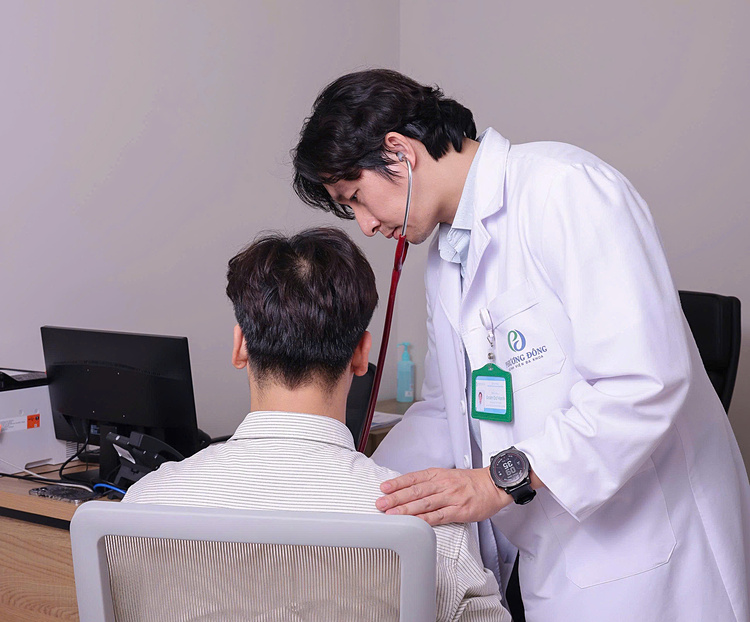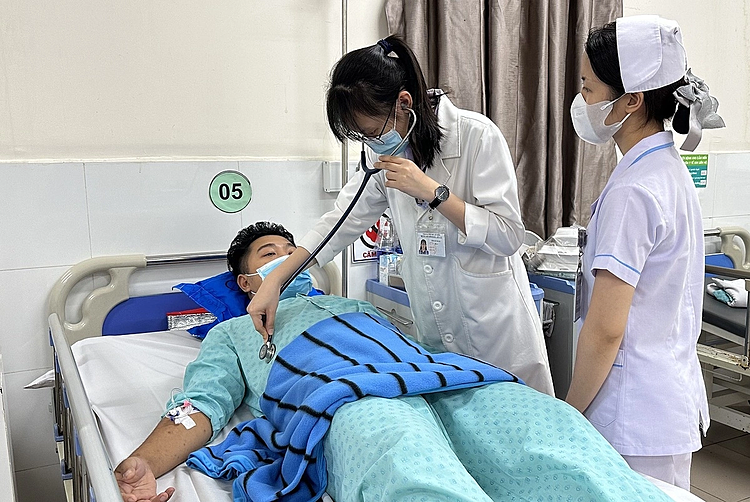The software engineer worked long hours, had irregular meals, drank 2-3 cups of coffee daily to combat drowsiness, and rarely exercised.
Earlier this year, he began experiencing mild headaches and dizziness, accompanied by high blood pressure readings during a routine check-up. However, he dismissed these symptoms as being caused by "lack of sleep or work pressure". He only sought medical attention when the symptoms worsened.
At the hospital, doctors found his blood pressure exceeding 180 mmHg, while the normal range is between 90/60 mmHg and 129/84 mmHg. "I'm young, I can't have hypertension. It's probably just because I drink too much coffee," Kien told the doctor.
However, further tests revealed stage 3 chronic kidney failure. Dr. Doan Du Manh, from the Vietnam Society of Vascular Diseases, said that Kien's elevated creatinine levels and reduced kidney function (around 40%) were the primary cause of his hypertension.
Kien's case isn't isolated. Binh Dan Hospital in TP HCM treated a 23-year-old man with end-stage kidney failure, just two months after he was diagnosed with hypertension but neglected treatment. He frequently experienced headaches, dizziness, tongue numbness, and blurred vision. A month later, his blood pressure surpassed 180 mmHg, sometimes reaching 220 mmHg.
Despite being advised to be hospitalized for observation and further investigation, he hesitated. He only went to the hospital when the severe headaches became unbearable. By then, he was diagnosed with stage 5 kidney failure – the final stage – with severely impaired kidney function.
"This is a truly unfortunate case," the doctor commented, "Dismissing hypertension led to the consequence of lifelong dialysis.".
 |
A doctor examines and checks the blood pressure of a patient. Photo provided by the doctor |
A doctor examines and checks the blood pressure of a patient. Photo provided by the doctor
Chronic kidney disease is a growing public health concern in Vietnam, affecting over 10 million people, or about 12.8% of the adult population. Approximately 8,000 new cases are diagnosed annually, with an estimated 800,000 patients requiring dialysis.
The trend of kidney disease affecting younger individuals is evident. At the Nephrology Department of Binh Dan Hospital, doctors noted that about one-third of their patients are under 40. In many cases, prolonged, uncontrolled hypertension damages blood vessels, reducing blood flow to the kidneys and destroying the glomerular filters, ultimately leading to kidney failure.
Conversely, many young people with hypertension have underlying kidney failure as the root cause. According to doctors, kidneys act like miniature wastewater treatment plants. Daily, they filter about 180 liters of blood, removing waste, toxins, and excess water from the body through urine. When kidney function declines, it's like the plant malfunctioning or getting clogged, hindering the blood filtration process.
One of the kidney's crucial roles is regulating salt (sodium) and water balance. Weakened kidneys can't effectively remove excess salt and water. Salt retains water, and this fluid buildup increases blood volume. Higher blood volume exerts greater pressure on blood vessel walls, similar to overfilling a pipe, causing hypertension, doctors explain.
Besides filtering blood, kidneys produce renin, a vital enzyme. Renin is part of the Renin-Angiotensin-Aldosterone System (RAAS), the body's "blood pressure regulator".
When kidneys sense inadequate blood flow (often due to damage), they release renin. This triggers a chain reaction, producing angiotensin II, a powerful vasoconstrictor. Angiotensin II narrows blood vessels, forcing the heart to pump harder to circulate blood, leading to hypertension.
Angiotensin II also stimulates the adrenal glands to produce aldosterone, which signals the kidneys to retain more salt and water. This further increases blood volume and elevates blood pressure, creating a dangerous cycle: weakened kidneys cause hypertension, which further damages the kidneys.
Similarly, Dr. Le Thi Dan Thuy, Head of the Nephrology - Dialysis Department at Binh Dan Hospital, confirms the strong link between hypertension and kidney disease. "Prolonged hypertension can damage blood vessels, reducing blood flow to the kidneys and damaging glomerular filters, increasing the risk of kidney failure. Conversely, reduced kidney function impairs blood pressure regulation, leading to increased blood pressure," Dr. Thuy explains.
 |
A doctor at Binh Dan Hospital examines the 23-year-old man before dialysis. Photo: Tran Nhung |
A doctor at Binh Dan Hospital examines the 23-year-old man before dialysis. Photo: Tran Nhung
Experts attribute the increasing prevalence of hypertension and kidney failure among young people to unhealthy lifestyles: lack of exercise, high-salt diets, preference for fast food and saturated fats, excessive alcohol consumption, smoking, and chronic stress.
Consuming too much salt, especially from processed foods like sausages and cold cuts, forces the body to retain more water. This increased blood volume puts pressure on blood vessel walls, causing hypertension.
The World Health Organization urges individuals to monitor their blood pressure regularly for early disease detection. Suspected hypertension warrants further examination for proper diagnosis, treatment, and screening for complications.
For prevention, individuals should exercise for at least 30 minutes daily, follow a low-salt diet (under 5g/day, equivalent to two teaspoons), eat plenty of fruits and vegetables, limit alcohol, maintain a healthy weight, and avoid smoking.
"Healthy lifestyle changes and proactive health screenings are key to protecting kidney health and preventing dangerous complications," advises Dr. Manh.
Thuy Quynh












